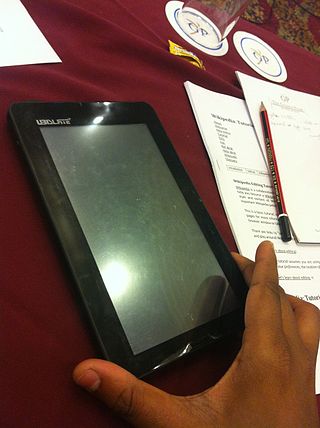
The Commodore 64, also known as the C64, is an 8-bit home computer introduced in January 1982 by Commodore International. It has been listed in the Guinness World Records as the highest-selling single computer model of all time, with independent estimates placing the number sold between 12.5 and 17 million units. Volume production started in early 1982, marketing in August for US$595. Preceded by the VIC-20 and Commodore PET, the C64 took its name from its 64 kilobytes(65,536 bytes) of RAM. With support for multicolor sprites and a custom chip for waveform generation, the C64 could create superior visuals and audio compared to systems without such custom hardware.
The 88000 is a RISC instruction set architecture developed by Motorola during the 1980s. The MC88100 arrived on the market in 1988, some two years after the competing SPARC and MIPS. Due to the late start and extensive delays releasing the second-generation MC88110, the m88k achieved very limited success outside of the MVME platform and embedded controller environments. When Motorola joined the AIM alliance in 1991 to develop the PowerPC, further development of the 88000 ended.

Norsk Data was a minicomputer manufacturer located in Oslo, Norway. Existing from 1967 to 1998, it had its most active period from the early 1970s to the late 1980s. At the company's peak in 1987, it was the second largest company in Norway and employed over 4,500 people.

A computer terminal is an electronic or electromechanical hardware device that can be used for entering data into, and transcribing data from, a computer or a computing system. Most early computers only had a front panel to input or display bits and had to be connected to a terminal to print or input text through a keyboard. Teleprinters were used as early-day hard-copy terminals and predated the use of a computer screen by decades. The computer would typically transmit a line of data which would be printed on paper, and accept a line of data from a keyboard over a serial or other interface. Starting in the mid-1970s with microcomputers such as the Sphere 1, Sol-20, and Apple I, display circuitry and keyboards began to be integrated into personal and workstation computer systems, with the computer handling character generation and outputting to a CRT display such as a computer monitor or, sometimes, a consumer TV, but most larger computers continued to require terminals.

Prodigy Communications Corporation was an online service from 1984 to 2001 that offered its subscribers access to a broad range of networked services. It was one of the major internet service providers of the 1990s.

A screen reader is a form of assistive technology (AT) that renders text and image content as speech or braille output. Screen readers are essential to people who are blind, and are useful to people who are visually impaired, illiterate, or have a learning disability. Screen readers are software applications that attempt to convey what people with normal eyesight see on a display to their users via non-visual means, like text-to-speech, sound icons, or a braille device. They do this by applying a wide variety of techniques that include, for example, interacting with dedicated accessibility APIs, using various operating system features, and employing hooking techniques.
RealVNC is a company that provides remote access software. Their VNC Connect software consists of a server and client application, which exchange data over the RFB protocol to allow the Viewer to control the Server's screen remotely. The application is used, for example, by IT support engineers to provide helpdesk services to remote users.

Mobile computing is human–computer interaction in which a computer is expected to be transported during normal usage and allow for transmission of data, which can include voice and video transmissions. Mobile computing involves mobile communication, mobile hardware, and mobile software. Communication issues include ad hoc networks and infrastructure networks as well as communication properties, protocols, data formats, and concrete technologies. Hardware includes mobile devices or device components. Mobile software deals with the characteristics and requirements of mobile applications.
Trespass to chattels, also called trespass to personalty or trespass to personal property, is a tort whereby the infringing party has intentionally interfered with another person's lawful possession of a chattel. The interference can be any physical contact with the chattel in a quantifiable way, or any dispossession of the chattel. As opposed to the greater wrong of conversion, trespass to chattels is argued to be actionable per se.
Web scraping, web harvesting, or web data extraction is data scraping used for extracting data from websites. Web scraping software may directly access the World Wide Web using the Hypertext Transfer Protocol or a web browser. While web scraping can be done manually by a software user, the term typically refers to automated processes implemented using a bot or web crawler. It is a form of copying in which specific data is gathered and copied from the web, typically into a central local database or spreadsheet, for later retrieval or analysis.
Dolphin Drilling Holdings Limited is an offshore drilling rig company headquartered in Aberdeen, Scotland, United Kingdom with its main subsidiary Dolphin Drilling AS located in Sandnes, Norway. Until 2019, Dolphin Drilling had its headquarters in Oslo, Norway.

Orca is a free and open-source, flexible, extensible screen reader from the GNOME project for individuals who are blind or visually impaired. Using various combinations of speech synthesis and braille, Orca helps provide access to applications and toolkits that support AT-SPI.

The BBC Microcomputer System, or BBC Micro, is a series of microcomputers designed and built by Acorn Computers Limited in the 1980s for the Computer Literacy Project of the BBC. The machine was the focus of a number of educational BBC TV programmes on computer literacy, starting with The Computer Programme in 1982, followed by Making the Most of the Micro, Computers in Control in 1983, and finally Micro Live in 1985.
Mammoth Screen Limited is a UK-based production company that was established in 2007 by Michele Buck and Damien Timmer. It produces drama for key UK broadcasters, especially ITV, and international distribution. Others may be looking for Mammoth Pictures, a US-based production company.

The Digital Millennium Copyright Act (DMCA) is a 1998 United States copyright law that implements two 1996 treaties of the World Intellectual Property Organization (WIPO). It criminalizes production and dissemination of technology, devices, or services intended to circumvent measures that control access to copyrighted works. It also criminalizes the act of circumventing an access control, whether or not there is actual infringement of copyright itself. In addition, the DMCA heightens the penalties for copyright infringement on the Internet. Passed on October 12, 1998, by a unanimous vote in the United States Senate and signed into law by President Bill Clinton on October 28, 1998, the DMCA amended Title 17 of the United States Code to extend the reach of copyright, while limiting the liability of the providers of online services for copyright infringement by their users.

Aakash a.k.a. Ubislate 7+, is a low-cost Android-based tablet computer promoted by the Government of India as part of an initiative to link 25,000 colleges and 400 universities in an e-learning program. It was produced by the British-Canadian company DataWind, and manufactured by the company, at a production center in Hyderabad. The tablet was officially launched as the Aakash in New Delhi on 5 October 2011. The Indian Ministry of Human Resource Development announced an upgraded second-generation model called Aakash 2 in April 2012.

Jimdo is a German website builder privately held and headquartered in Hamburg, Germany, with offices in Munich and Tokyo. Jimdo has two products, Creator and Dolphin, offering free and paid plans.
The Adam Tablet is a tablet computer designed by Bangalore-based firm Notion Ink Design Labs. The worldwide launch occurred on December 18, 2010 via a video released by Notion Ink detailing their Eden Interface. On December 9 a limited number of devices were released for pre-order globally, followed by a larger pre-order starting January 9, 2011 and an open subscription pre-order from 11 January 2011. The Adam runs a customized version of Android 2.2 Froyo, and has released beta versions of Android 3.0 Honeycomb and Android 4.0 Ice Cream Sandwich The beta versions released were largely done through the efforts of volunteer developers. The Adam is set to be the first Android device marketed to contain Pixel Qi's low-power, dual-mode display. The device is one of several tablet form-factor devices to include a dual-core Nvidia Tegra 2 processor that can support 1080p video output mirroring.

Split screen is a display technique in computer graphics that consists of dividing graphics and/or text into non-overlapping adjacent parts, typically as two or four rectangular areas. This allows for the simultaneous presentation of (usually) related graphical and textual information on a computer display. TV sports adopted this presentation methodology in the 1960s for instant replay.











